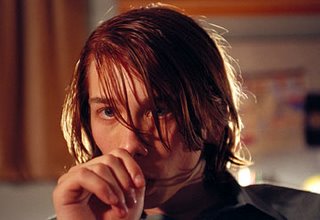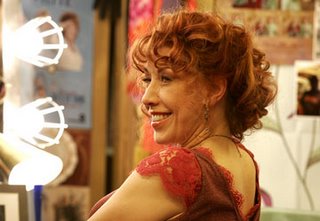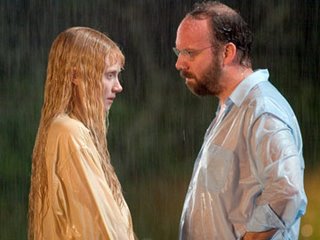Thumbsucker (2005)
Thumbsucker, 2005
Written & Directed by Mike Mills
Based on the novel by Walter Kirn

In a marketplace where film, television, music, and tabloid journalism are increasingly difficult to tell apart, an "exciting new star" is someone who dabbles in the first three but exists mainly for the fourth. While I'm sure his exquisitely androgynous face won't sell a single supermarket rag all year, I will still firmly declare that 20-year-old Lou Taylor Pucci is the most Exciting New Star of 2005.
Pucci first made a splash in May, with his performance as the devastatingly anonymous John Voss in the HBO adaptation of Empire Falls. Where this film gave him but a few scenes to portray a lifetime of secret suffering, Thumbsucker gives him nearly every scene of the film to explore a character, and he does so with astonishing confidence and skill, invoking the loner spirit of James Dean but with a personality all his own.
Pucci plays Justin Cobb, a high schooler with the Title Quirk. He is both bored and angry with life, and in moments of personal crisis, turns to a bathroom stall or the privacy of his bedroom to indulge his embarrassing habit -- make that embarrassing and teeth-warping, as he has already had corrective dental work, and at the rate he's going, he'll need a second procedure. As Thumbsucker unfolds, Justin trades addictions, first weaning himself off of his thumb in exchange for psychiatric meds and Debate Club (!). Pucci embraces Justin's extremes, from his most endearing to his most obnoxious, in a clear-eyed portrait of teenage confusion.
Director Mike Mills, in his feature film debut, tells the story with an attentive eye and an unobtrusive hand, and coaxes rich, honest performances from every last cast member. Tilda Swinton and Vincent D'Onofrio portray Justin's "Audrey and Mike" -- they don't like to be called Mom and Dad, it makes them sound old -- with equal parts concerned, devoted parent and flawed, struggling human being; they are not the ineffectual and easily faulted parents that a lesser film would present. Vince Vaughn, allowed to keep his nervous energy, but painted on the canvas of a complete nerd of a debate club teacher, is a bizarre casting choice that proves worth the gamble. Benjamin Bratt brings swarthy humor to his brief role as a TV star Audrey crushes on. Even Keanu Reeves, who I have hated in everything I have ever seen him in, isn't half bad as Justin's dopey-spiritual dentist. (Draw what conclusions you will about that actor-character match-up.)
Another sort-of cast member is the late Elliott Smith, playing the same voice-of-the-film role Cat Stevens did in Harold and Maude, and even covering one of Stevens's songs used in that film. It's awfully ambitious, and a little foolish, to openly court such a comparison, but Thumbsucker, with its misfit sensibility, can get away with it.
Grade: A-








